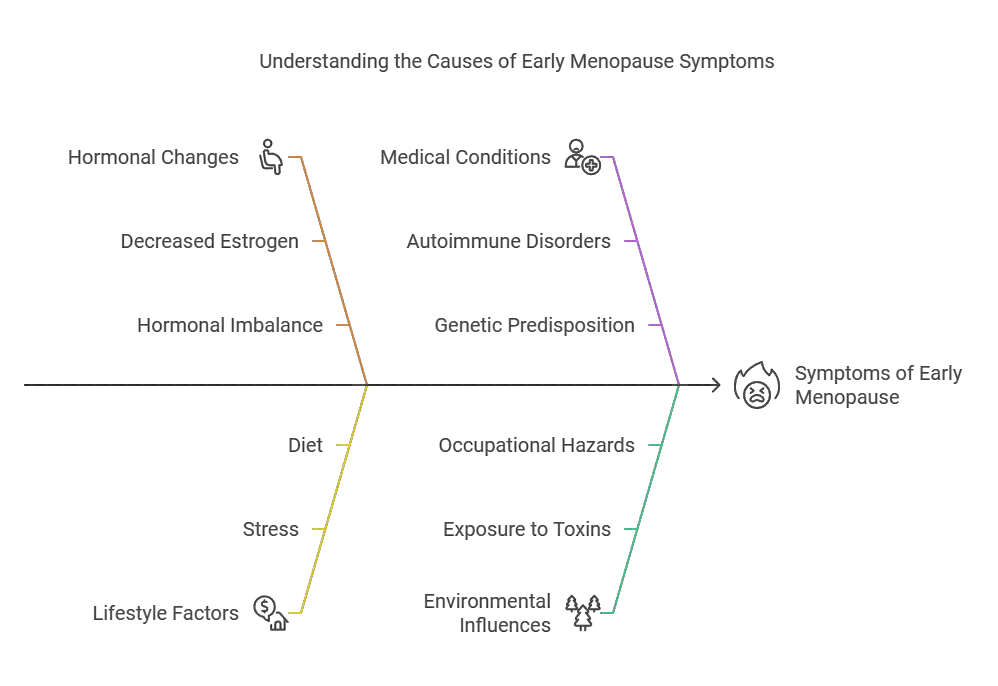Could You Be Experiencing Early Menopause? Signs, Causes, and Treatment Options
It’s the middle of the night, and you wake up drenched in sweat. Lately, you’ve been dealing with hot flashes during the day and irregular periods—in fact, you’ve missed your last two. Multiple pregnancy tests came back negative, but something still feels off. If you’re a menstruating person in your 30s or 40s, you might wonder: could these be signs of early menopause?
While menopause typically occurs in your late 40s or early 50s, it’s possible for it to arrive earlier. Here’s everything experts want you to know about early menopause, from its causes and symptoms to its effects on your health and the treatments available.
What Is Early Menopause?
Menopause marks the end of a person’s menstrual cycles, signaling the conclusion of their reproductive years. It’s a natural part of aging and typically occurs between the ages of 45 and 55. Early menopause, however, occurs before age 45, and when it happens before age 40, it’s classified as premature menopause.
According to Michael Thomas, MD, OB/GYN and department chair of Obstetrics & Gynecology at the University of Cincinnati College of Medicine, differentiating between early and premature menopause is crucial for determining the appropriate diagnostic tests and treatments.
Before menopause begins, most individuals experience perimenopause, a transitional phase that lasts around four years. For those with early menopause, however, this phase may be shorter.
Symptoms of Early Menopause
The signs of early menopause are similar to those of regular menopause and include:
- Hot flashes
- Missed or irregular periods
- Vaginal dryness
- Night sweats
- Mood swings
- Decreased libido

One exception arises for individuals using hormonal birth control. These medications can mask menopause symptoms, as the synthetic hormones they provide may suppress the effects of reduced natural estrogen levels.
What Causes Early Menopause?
The exact cause of early menopause is often unknown, but several factors may contribute:
- Genetics: A family history of early menopause increases your likelihood of experiencing it.
- Surgical Removal of Ovaries: This procedure eliminates the body’s primary source of estrogen, leading to early menopause.
- Chromosomal Disorders: Conditions affecting one of the X chromosomes, such as Turner syndrome, can cause premature menopause.
- Chemotherapy or Radiation Therapy: These treatments may damage ovarian tissue, reducing hormone production.
Despite these known contributors, Michael Thomas, MD, emphasizes that most cases of early menopause have no identifiable cause.
Can Stress Trigger Early Menopause?
Stress is often blamed for a variety of health conditions, but its connection to early menopause is indirect. While stress can exacerbate menopause symptoms—a 2021 study found that stressful events intensified symptoms by 21% —it’s not a primary cause of early menopause.
Potential Health Risks of Early Menopause
Early menopause brings unique challenges due to the extended period of low estrogen levels. Reduced estrogen can affect various aspects of health:
- Bone Health: Low estrogen increases the risk of osteoporosis. Women experiencing early menopause should consider early bone density scans.
- Heart Health: Estrogen plays a role in maintaining cardiovascular health, and its premature loss may elevate the risk of heart disease.
Is Early Menopause Hereditary?
While not entirely understood, early menopause does appear to have a genetic component. If your mother or close female relatives experienced early menopause, you might be at a higher risk. However, genetics is just one piece of the puzzle.
Treatment Options for Early Menopause
The treatments for early menopause are generally the same as for regular menopause. They aim to alleviate symptoms and reduce health risks associated with low estrogen levels. Options include:
- Hormone Therapy: Replacing estrogen can help relieve symptoms and protect bone and heart health.
- Non-Hormonal Medications: These target specific symptoms, such as hot flashes.
- Lifestyle Changes: Regular exercise, a balanced diet rich in calcium, and stress management can improve overall health.
- Mindfulness and Cognitive Behavioral Therapy (CBT): These approaches may help manage mood swings and other psychological symptoms.
Dr. Pamela Promecene, an OB/GYN and professor at UT Health Houston, emphasizes that treatments should be tailored to the individual’s symptoms and health profile.
Fertility and Early Menopause
Even if you’ve entered early menopause, it’s still possible to get pregnant during the perimenopausal phase. As long as you’re experiencing occasional periods, ovulation may still occur. For those wishing to avoid pregnancy, using contraception remains essential.
For individuals hoping to conceive, early menopause may present challenges. Consulting a fertility specialist can help explore options, such as egg freezing or in-vitro fertilization (IVF).
When to Consult a Healthcare Provider
If you notice irregular periods, hot flashes, or other menopause-related symptoms before age 45, it’s important to seek medical advice. Documenting your symptoms can help healthcare providers pinpoint the cause and recommend appropriate tests, such as hormone level assessments.
Early menopause doesn’t have to disrupt your life. With the right support, treatments, and lifestyle adjustments, you can navigate this transition with confidence and maintain your overall health.

